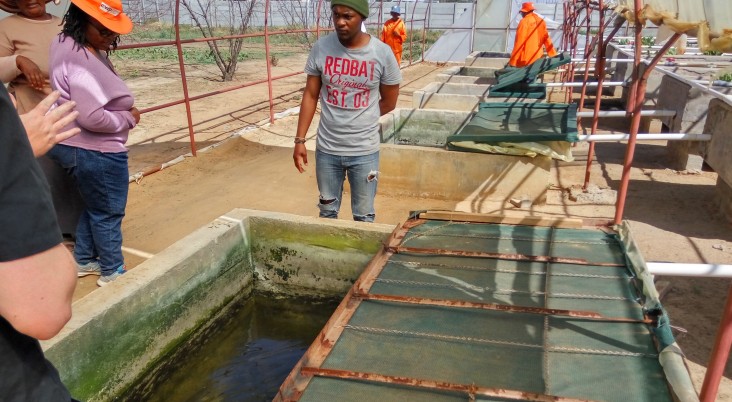Speeches Shim

“As a disabled person I’m glad that I’m able to produce food to feed my family and the surrounding community. Re ea phela! (We can live in South Sotho!)” That’s Mom Rosie Mateko speaking. She’s a project leader and founder of Monyakeng Disabled People of South Africa. Mateko had been a teacher until she was disabled by a stroke a few years ago.
Monyakeng is in Wesselsbron - a small maize farming town, north-west of the gold mining town of Welkom in the Free State province. It’s a dry area due to changing weather patterns, and water is scarce especially under the current drought.
Unemployment here is high for everyone, but disabled people in particular, are often excluded from the formal economy because of their conditions. INMED Partnerships for Children is trying to change that.
The organization originally worked to create a world where children would be safe, healthy, educated and able to thrive. In 2012, it expanded its work to include disabled people, and began to work with Monyakeng Disabled People of South Africa, which was already doing some scale agricultural farming. INMED offered technical support and introduced them to climate-smart agriculture by constructing aquaponics where they grow vegetables and also raise fish mainly using harvested rainwater.
Aquaponics is the combination of aquaculture (raising fish) and hydroponics (soil-less growing of plants) in one integrated system. Fish waste provides an organic food source for the plants while the plants naturally filter the water for the fish.
The project started off well ensuring self-reliance among members and improved access to fresh and nutritious produce through disability-inclusive agriculture, but in 2014 INMED ran out of funding and could no longer offer technical assistance to the Monyakeng group. USAID, which is committed to disability-inclusive development, stepped in and solicited a disability grant. The agency employs a dual approach which supports disability-specific programs to address targeted needs and also integrates disability into its programs. The grant was subsequently awarded to INMED Partnerships for Children to expand its Adaptive Agriculture Program for the disabled in the Free State.
This USAID grant known as the Expanding Participation of the Disabled in Climate-Adaptive Agriculture will integrate people with disabilities into the modern economy through new, adaptive agricultural technologies and give them access to financing. The program also seeks to strengthen the ability of the Disabled People South Africa (DPSA) Free State Provincial Office to better address and support the needs of its members.
Moving forward, INMED Partnerships for Children plans to upgrade the Monyakeng aquaponics and also build other units at two sites in Phomolong, Hennenman and Maokeng, Kroonstad in the Free State with support from USAID/Southern Africa in partnership with the local government.
This is what Unathi Sihlahla; INMED’s Program Director had to say about this new partnership: “This exciting opportunity to partner with USAID came at an opportune time in our mission to advance disability-inclusive agribusiness projects. Projects such as Monyakeng are a clear demonstration of how through aquaponics, people with disabilities can have a significant impact on food security. With this grant from USAID we plan to build upon these successes and ensure sustainable income opportunities in aquaponics and better lives for members of disabled led cooperatives.”
For more information on INMED: https://inmed.org/what-we-do/health-and-nutrition/health-in-action-south-africa/

Comment
Make a general inquiry or suggest an improvement.